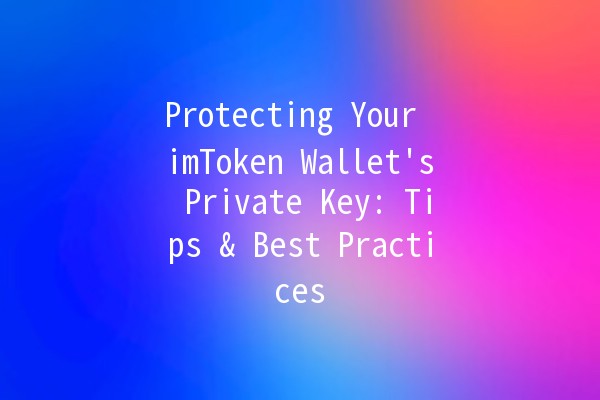In the world of cryptocurrency, safeguarding your assets is paramount. Your imToken wallet, a decentralized cryptocurrency wallet, is a secure space to store, manage, and trade your digital currencies. However, if your private key is compromised, you risk losing access to your assets. To ensure that your digital wealth remains secure, it's crucial to adopt best practices for protecting your private key. Below are some effective strategies that will help you keep your private key safe and secure.
Before we dive into the protective measures, let’s understand what a private key is. Your private key is essentially a secure digital key that allows you to access your cryptocurrency holdings. Think of it as a password or PIN to your bank account, but more powerful and sensitive. Anyone with your private key can control your funds, which makes keeping it secure a top priority.

With this understanding in mind, let’s explore actionable tips for protecting your imToken wallet's private key.
Utilizing a strong password for your imToken wallet alongside enabling TwoFactor Authentication (2FA) is one of the most effective measures to increase security.
Strong Password: Create a complex password that combines upper and lowercase letters, numbers, and special characters. Avoid using easily guessable information like birthdays or common words.
2FA: Activate 2FA in your wallet settings. This means that even if someone obtains your password, they would still need a second form of verification (like a code sent to your mobile device) to access your wallet.
If your password is "ImToken2023!", consider changing it to something less predictable, like "9T@kbR$eZ4#9qV!" to enhance security. Pair this with a 2FA app such as Google Authenticator or Authy.
Regular updates to your wallet app and device software can protect against the latest security vulnerabilities.
Enable automatic updates for your imToken wallet application and ensure your operating system is also updated.
If you receive notifications from imToken about new versions or updates, take immediate action to install them. The same applies to your smartphone’s operating system; always keep it equipped with the latest security patches.
Where you store your private key is crucial. Digital storage is vulnerable to hacks, while physical notes can be lost or damaged.
Hardware Wallets: Invest in a hardware wallet that stores your private key offline, making it much harder to access for hackers.
Paper Wallets: If you choose a paper wallet, write your private key down and store it in a secure location, like a safe.
Consider using a reputable hardware wallet like Ledger or Trezor. If you go the paper wallet route, make sure it’s stored in a waterproof and fireproof safe.
Public WiFi can be a hotbed for cyber attacks. Using your wallet in such environments can expose your private key.
Avoid accessing your imToken wallet over public WiFi. Use a VPN (Virtual Private Network) if you must connect on a public network.
Only access sensitive information from secure and private networks.
If you're at a coffee shop and need to check something in your wallet, opt for your mobile data instead of the café’s public WiFi.
Phishing scams are designed to lure you into giving away sensitive information like your private key.
Verify all communication. Always check the URL of any website and the sender’s email address before clicking any links.
Avoid providing your private key or signing transactions based on unsolicited messages.
If you receive an email claiming to be from imToken asking for your private key, do not respond. Instead, visit the imToken official website to contact their support for verification.
Always back up your wallet regularly to recover lost data. Use a secure method, such as an encrypted USB drive.
Stay informed about the latest security threats in cryptocurrency. Understanding potential risks will help you avoid pitfalls.
Consider using multiple wallets for different amounts of cryptocurrency. Store larger amounts in a hardware wallet and keep smaller amounts in your imToken app for daily transactions.
Join cryptocurrency forums and communities to share knowledge and learn about new security measures others are implementing.
Losing your private key usually means losing access to your cryptocurrency permanently. There are no recovery options, so it’s imperative to back it up securely.
If someone else has access to your private key, they can control your funds without your consent. It’s crucial to act swiftly by changing passwords and withdrawing remaining assets if possible.
Phishing websites often have misspelled URLs or unusual prompts. Always check for secure connection symbols like “https://” and look for legitimate contact information.
For beginners, wallets like Ledger Nano S or Trezor One are userfriendly and provide excellent security features.
Storing your private key in the cloud poses risks unless it’s encrypted and secured with a strong password and 2FA. It’s generally safer to keep it offline.
Yes, using antivirus software can help protect your device from malware and viruses that could compromise your wallet’s integrity.
Embracing these practices can significantly enhance the security of your imToken wallet. The cryptocurrency landscape can be unpredictable, but awareness and proactivity can help you protect your digital assets effectively.